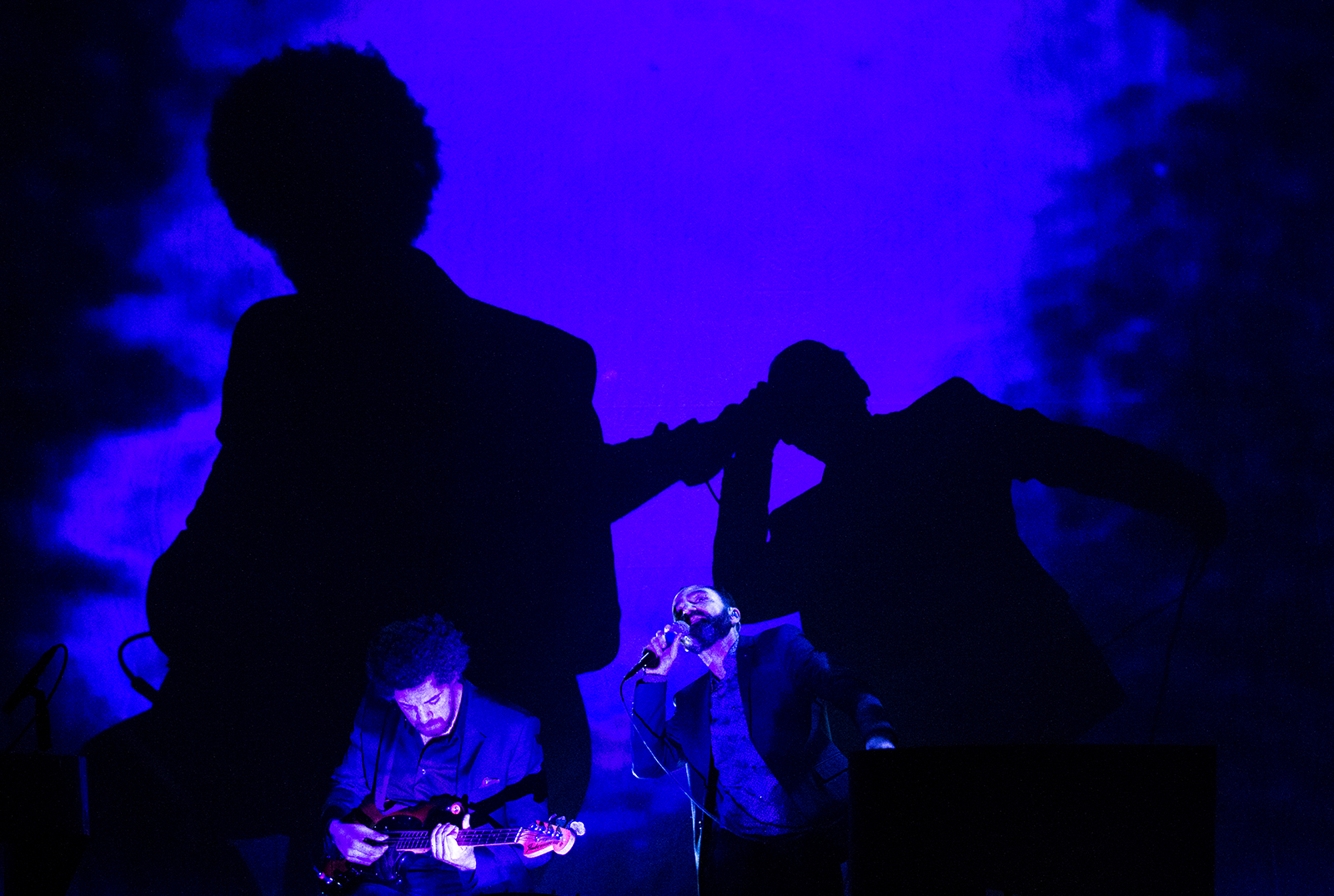Concert Review: ‘Broken Bells’

The Broken Bells’ duo of producer Danger Mouse (left) and frontman James Mercer (right) performed Saturday at the Orpheum Theatre in Los Angeles. (Felicia Ramirez/Daily Bruin senior staff)
By Natalie Green
Oct. 26, 2014 4:19 p.m.
Dim lights, high ceilings and a crowd eager to be pleased set the ambience for Saturday’s Broken Bells performance at the Orpheum Theatre.
The night began quietly with audience mingling, and few seats were filled when the opening group Austra walked on stage unannounced. A Canadian electronic band led by frontwoman Katie Stelmanis, Austra began its set before the audience realized it.
The quartet, made up of Stelmanis on vocals and keyboard, Maya Postepski on drums, Dorian Wolf on bass and keyboard and Ryan Wonsiak on keyboard, filled the entire space with a ringing, melodious sound. With a vibe of hipster independence and an almost unaware stage presence, Austra flowed from song to song without pause.
Stelmanis’ voice was stunning, her tones lilting over hypnotic keyboard synthesizers and powerful rhythms from Postepski. Like a female Bon Iver, Stelmanis’ lyrics were fairly unintelligible, but she gave the impression of their importance and beauty with sound.
Other than a brief “thank you” mid-set, Stelmanis didn’t speak to the small crowd until before its last song. Normally, Austra plays in grungy clubs and bars, Stelmanis said, and the Orpheum tested its ability to be seen.
As Austra exited, more and more people piled into the small venue, almost every seat filled in anticipation for Broken Bells.
Frontman – lead vocalist and guitarist for The Shins – James Mercer is half of Broken Bells’ indie rock duo, along with Brian Burton, also known as Danger Mouse. On tour, the two are joined by Jon Sortland on drums and Dan Elkan on guitar.
The atmosphere completely changed as soon as the houselights dimmed for Broken Bells, the room filling with applause.
In stark contrast to the low-key performance of Austra, Broken Bells accounted for all aspects of production value for a live show. The audience was projected on to the back of the stage and watched itself scream for Broken Bells until the group appeared.
Stage lights and spotlights colored the stage in moody purples, blues and reds, helping to amp up the crowd. The projections were replaced first with an interstellar theme and later a montage of artsy visuals and recycled album artwork. The irrelevant use of female imagery at times detracted from the staging; however, the music itself kept the performance rolling.
Broken Bells was at its finest live. Its visuals and stage presence showed its music to its best advantage, and Mercer’s voice soared, gritting at all of the right moments and was hit by a single, heavenly beam for most of the show.
The audience was instantaneously overjoyed. By the third song – “After the Disco” from Broken Bells’ second album – everyone was on his or her feet dancing and abandoned all regard for the restrictions of cushy seating or restraining aisles.
Mercer felt no need to pepper the audience with anecdotes in between songs and let the group’s music speak for itself. Like Austra, Broken Bells seamlessly launched from song to song, broken-up only with crowd uproar at favorites, such as “Sailing to Nowhere” and “Leave It Alone,” and a mix of slower ballads and pulsing electronic tunes.
For Broken Bells’ performance, a full brass section’s entrance or the addition of soulful backup singers seemed not only unsurprising but necessary. The variety of instrumentation and rotation of Burton and Sortland between drums and guitar served to break-up the audience’s undeniable focus on Mercer, allowing each musician to showcase their integral role in the evening.
The group and the audience agreed on the necessity of an encore, as Broken Bells were quickly roared back on stage for a few songs, which was made almost unneeded because of the near perfection that had preceded it.
Then, “Holding on for Life” closed the show, making the encore worthwhile after all.
– Natalie Green

